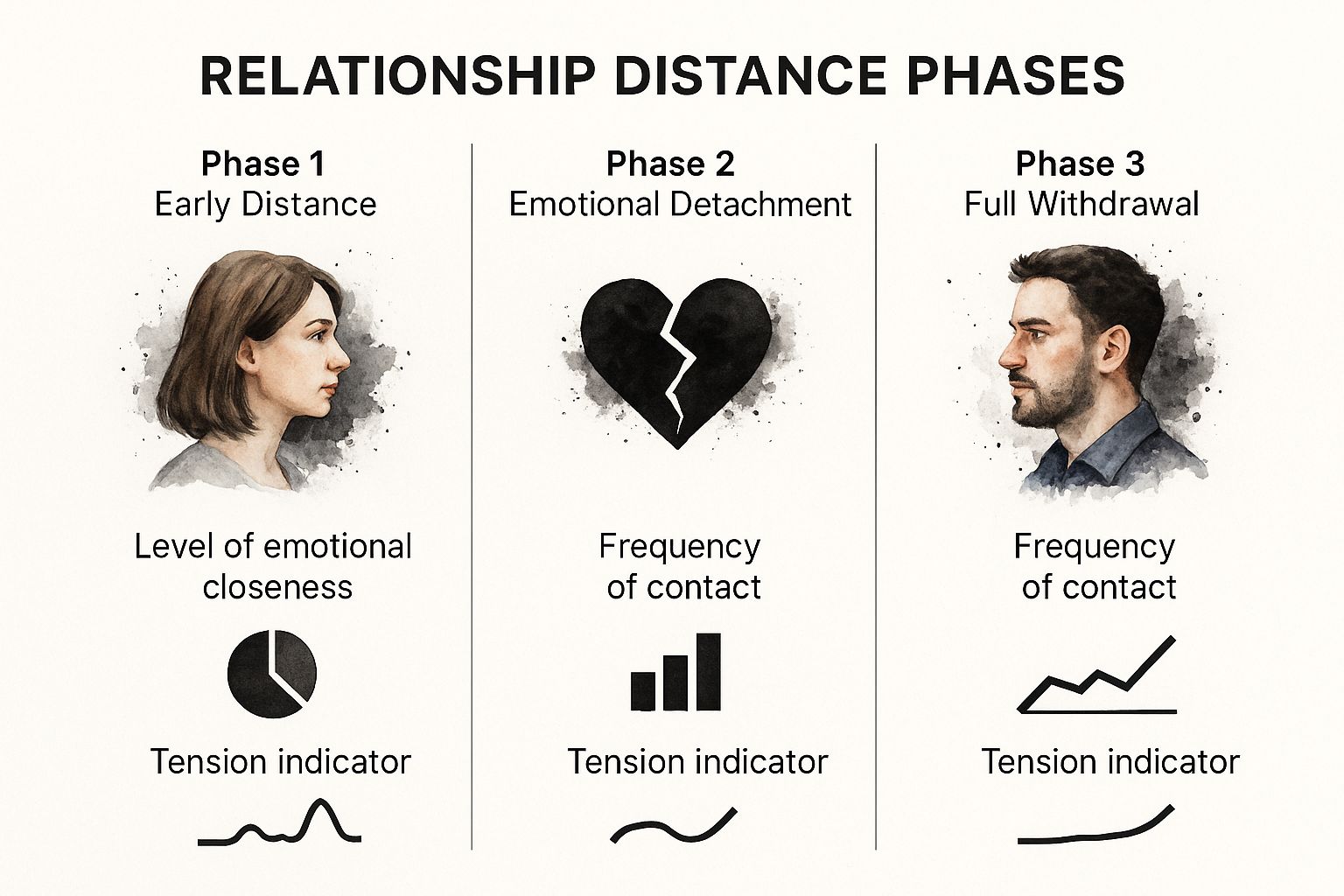When you're connecting with a guy and he suddenly goes quiet or distant, it's so easy to feel confused, hurt, and even a little panicked. But I want you to take a breath, because the reason why men pull away often has very little to do with you or the relationship itself.
More often than not, it's a reaction to their own internal pressures, anxieties, or fears. Think of it less like he's slamming a door in your face and more like he's hanging a 'Do Not Disturb' sign on it while he tries to sort things out in his own head.
The Moment He Starts To Pull Away

It’s one of the most jarring feelings in the world. One minute, you're talking and laughing constantly, the connection feels electric, and you're excited about where things are headed. The next, his texts get shorter, he's "busy" all the time, and you can just feel an emotional wall go up. It’s enough to make your mind race, trying to pinpoint what you did wrong.
But you're in the right place. This guide is your roadmap through this confusing territory. We're going to move past that initial wave of panic and get to a place of real understanding.
Once you know the common reasons men withdraw, you can stop reacting from a place of anxiety and start responding from a place of confidence. Understanding the why is the essential first step to knowing what to do next.
Common Triggers for Male Withdrawal
A man's distance can be sparked by all sorts of things, both internal and external. Sometimes the reasons are pretty complex, especially if he has an attachment style that makes him prone to needing space. If that sounds familiar, you can get a lot more clarity by learning what to do when an avoidant pushes you away.
To give you a clearer picture of what might be going on under the surface, I’ve put together a quick summary of the most common triggers we'll be exploring.
Common Triggers for Male Withdrawal A Quick Summary
This table breaks down the key internal and external pressures that often lead a man to create distance in a relationship.
| Trigger Category | Common Examples | Typical Manifestation |
|---|---|---|
| Internal Pressures | Fear of commitment, feeling emotionally overwhelmed, stress from work or family, a deep-seated fear of failure. | Becoming quiet and withdrawn, needing more alone time, a sudden drop in communication, avoiding deep or emotional conversations. |
| Relationship Dynamics | Feeling like the relationship is moving too fast, a perceived loss of independence, feeling pressured for a label or commitment. | Creating physical distance, seeming less affectionate, canceling plans last minute, being distracted when you're together. |
| External Factors | Societal pressure to be "strong" and unemotional, trauma from past relationships, unresolved personal issues from his past. | Isolating himself from you and others, becoming emotionally unavailable, shifting into "provider" mode, shutting down completely. |
Think of these categories as a starting point. As we go deeper, you'll start to see how these different factors can overlap and influence his behavior, giving you the insight you need to navigate the situation with grace.
Diving Into the Psychology of Why Men Pull Away
To really get what’s happening when a man pulls away, you have to look under the hood. His silence often isn't a calculated move designed to hurt you. More often than not, it's a deeply ingrained psychological reaction to stress, fear, or something that feels like a threat to his identity.
Think of it this way: emotional intimacy is a high-stakes investment. If his past investments ended in a total loss—like a brutal breakup or even rejection from his childhood—the fear of another bad outcome can trigger a powerful, protective retreat. It’s less about you and more about his own internal risk management system kicking into high gear.
The Fear of Vulnerability
For a lot of men, being vulnerable feels like a dangerous gamble. From a young age, many are socialized to be the rock—self-reliant, stoic, and always in control. Having to express deep emotions or admit he needs someone can feel like a direct violation of those core principles, sparking some serious internal conflict.
When a relationship starts getting deeper and requires more emotional honesty, it can feel like he's being asked to walk a tightrope without a net. Pulling away is his way of stepping back onto solid ground, a place where he feels more capable and in command of his own world.
This fear isn’t just about looking weak; it’s also tied to a deep-seated fear of failure. What if he opens up and doesn't get the support he needs? Or worse, what if he can't meet your emotional needs in return? The anxiety of failing you as a partner can be so overwhelming that creating distance feels like the only safe play.
The pressure to live up to traditional ideas of masculinity, combined with a fear of rejection and past hurts, all feed into this emotional withdrawal. It creates a massive barrier to the very intimacy that makes a relationship thrive.
The Overload Factor: Stress and Mental Health
It’s so important to remember that a man’s withdrawal can be a direct symptom of external stress or underlying mental health struggles. When a guy is completely overwhelmed by pressure from his job, money worries, or family drama, his bandwidth for emotional connection can just bottom out.
His mind is like a computer with way too many tabs open. It starts to lag, and eventually, it has to shut down the non-essential programs to keep from crashing. Unfortunately, emotional expression and deep connection are often the first "programs" to get closed.
This is a huge part of understanding why men pull away and what to do about it—it often starts with recognizing what's happening inside his head. His distance might have zero to do with his feelings for you and everything to do with being mentally and emotionally overloaded. This kind of emotional unavailability can often be a temporary state brought on by these outside pressures. For a much deeper look into this, check out our guide on what makes someone emotionally unavailable.
Societal and psychological factors really stack the deck here, as men are often taught to stuff their feelings down, which obviously complicates communication. This fear of being rejected, which can stem from bad experiences in the past, can make them pull back as a form of self-protection. You can discover more insights about men’s emotional health on ca4wellbeing.com. Getting a handle on this is the first step to navigating his distance with empathy instead of letting anxiety take over.
How Society Shapes Male Emotional Responses

A man’s decision to pull away often isn’t made in a vacuum. It's deeply connected to powerful—though often invisible—societal expectations that have shaped how he deals with emotions since he was a kid.
From a young age, many men learn that their value is tied to being strong, capable, and in control. Always. This relentless pressure creates an internal script where showing vulnerability, confusion, or fear feels like a major failure.
So, when he feels overwhelmed or like he’s not measuring up, his first instinct isn’t to reach out and talk about it. It’s to retreat. This withdrawal is a defense mechanism, a way for him to regain his footing in private, away from a world that tells him he has to handle his problems alone. It’s not a rejection of you, but a reaction to a lifetime of conditioning.
The Masculinity Threat
This instinct to self-isolate can kick into high gear when a man’s sense of masculinity feels threatened. This doesn't have to be some huge, dramatic event. It can be triggered by a setback at work, financial stress, or even just feeling like he’s not meeting your needs in the relationship.
Basically, any situation that makes him feel less than capable can activate this deep-seated defense.
Research shows that when men feel their masculinity is under fire, they often pull away to protect themselves. One study found that young men who received feedback suggesting they were "more feminine than average" reacted by emotionally and physically withdrawing from their partners. It was an attempt to restore their threatened sense of masculinity, even though it ended up hurting the relationship. You can learn more about these masculinity findings.
This helps explain why a man might go radio silent after a disagreement or a moment where he felt vulnerable. He isn't necessarily pushing you away; he's retreating to a space where he feels he can get his sense of strength and control back without being judged.
Understanding this societal context is a game-changer. It allows you to see his withdrawal not as a personal attack, but as part of his larger struggle against ingrained cultural norms that discourage emotional openness.
Recognizing these outside pressures is a critical piece of the puzzle when you’re trying to figure out why men pull away and what to do. It shifts your perspective from, "What did I do wrong?" to a more compassionate, "What external pressures might he be dealing with?"
This empathetic viewpoint is the first step toward responding in a way that creates safety and encourages him to reconnect when he's ready, rather than pushing him further into isolation. It empowers you to approach the situation with patience instead of panic.
Navigating the Modern Dating Landscape

To really get to the bottom of why men pull away, we need to zoom out a bit. It’s not always just about what’s happening between two people; sometimes, it’s about the entire world they’re dating in. The rules of dating have been completely rewritten, and this has created a ton of new pressures that can make a guy hit the brakes on commitment.
Some experts have even started calling it a "relationship recession." It’s a very real trend where a growing number of men, especially younger guys, aren't just single—they're not even looking for a relationship. This isn't just a vibe; the numbers back it up in a big way.
A 2022 Pew Research Center survey really put a spotlight on this, showing that 63% of men under 30 now identify as single. That’s a huge jump from just 51% in 2019. What’s even more telling is that the number of single men actually trying to find a partner dropped from 61% to only 50% in that same short time. It seems to be a perfect storm of economic anxiety and a mismatch in what men and women are looking for.
The Pressure of Shifting Expectations
So, what's really going on here? A massive piece of the puzzle is the crazy pressure men feel to have their lives completely in order before getting serious with someone. They often carry this heavy expectation—from society, from family, or from themselves—to hit a certain level of financial stability and career success first.
With the cost of everything going up and the economy feeling shaky, hitting that traditional benchmark of "success" feels more out of reach than ever. A lot of men look at their bank accounts and their job titles and just feel like they don’t measure up. They feel they can’t provide the kind of life they think they’re supposed to.
This isn’t about pointing fingers at anyone. It’s just the reality of the situation. When a guy feels like he can't meet these expectations, pulling away from a relationship can feel like the only logical move. It's his way of not setting himself (and you) up for what he sees as inevitable failure.
For some men, pulling away isn’t a rejection of their partner but a retreat from expectations they feel they cannot meet. It’s a self-preservation tactic in a high-pressure dating environment.
Staying Safe in a Complex World
This tangled new dating world also means we all have to be a little more careful. As you try to figure out these new dynamics, the most important thing is to look out for yourself. It’s just smart to be aware and cautious, especially when you're just getting to know someone.
Putting your safety first gives you the confidence to enjoy dating without unnecessary anxiety. A great place to start is by brushing up on some essential online dating safety tips to make sure you feel secure.
When you see the bigger picture, you start to understand that his pulling away might have less to do with you and more to do with these massive societal shifts. The reasons why men pull away and what to do about it become clearer when you have this context. It helps you approach the situation with more empathy and a better plan.
Your Practical Action Plan For What To Do
When a guy starts to pull away, that first reaction you have can set the tone for everything that comes next. It's so easy to let panic take over, which usually leads to doing things that only push him further away. This kicks off a painful cycle of your anxiety growing as his distance does.
The secret is to learn how to respond instead of react. This requires a calm, confident game plan that honors his need for space just as much as your own need for emotional peace. This isn't about playing games or learning tricks; it's about making a fundamental shift from chasing him to attracting him back naturally. Instead of demanding answers, you create a safe, pressure-free vibe that actually makes him want to come back when he’s ready.
You become a source of peace, not pressure. That’s the whole ball game.
The image below gives you a visual of how this emotional withdrawal typically plays out, showing the relationship between tension, contact, and closeness.

As you can see, once he moves past that initial bit of distance and into a full withdrawal, the window for a positive reconnection gets smaller and smaller if your response isn't handled with care.
Giving Him Space Without Losing Yourself
The single most powerful—and often the most difficult—first step is to give him space. It feels completely backward, I know. Every instinct is screaming at you to pull him closer, but that’s exactly what you can’t do.
Think of it like a rubber band. The more you pull at it by texting, calling, and demanding his attention, the more tension you build. But when you let it go? The tension vanishes, allowing it to snap back to its natural position.
Giving him space doesn't mean disappearing or giving him the silent treatment. It simply means you stop initiating all the contact and redirect that energy back onto yourself and your own life. This isn't just a strategy; it's an act of self-respect. It broadcasts confidence and shows him that your world keeps spinning, with or without him in the center of it.
This is your chance to call up your friends, dive back into that hobby you love, or just enjoy your own company for a change. When you do this, you’re not just killing time—you're rebuilding your own emotional center of gravity, which is incredibly attractive. You’re no longer the girl waiting by the phone. You're the woman living a full, interesting life that he can either be a part of or miss out on.
"The answer to intensity is presence. Because when we actually get present with the person in front of us and the stage that we’re at, our words and our actions will be a direct mirror of what’s actually going on, not the story we’ve told ourselves."
This mindset keeps you from making decisions based on the anxious stories we all tell ourselves. Instead, you're grounded in the reality of your own awesome, fulfilling life.
How To Communicate Your Needs Effectively
If—or when—he eventually reaches out, how you communicate is everything. This is where so many people stumble. They unleash all their pent-up frustration and anxiety, which only proves his fears right: that the situation is too intense and too much pressure.
A much better approach is to use clear, calm, and non-accusatory language. To make this super practical, here’s a look at how to handle this moment effectively versus the common mistakes we all tend to make.
Effective Responses vs. Common Mistakes
| Situation | What to Do (Effective Response) | What to Avoid (Common Mistake) |
|---|---|---|
| He finally texts after a period of silence. | "Hey, it’s nice to hear from you. I hope you're doing okay." (Keeps it light and open-ended.) | "Finally! I was wondering if you were ever going to text me back." (Sounds accusatory and demanding.) |
| You want to express how his distance made you feel. | "I've been feeling a bit disconnected lately since we haven't talked as much. I really value our connection." (Uses "I" statements, focuses on your feelings.) | "Why have you been ignoring me? You just disappeared and left me hanging." (Blames him and puts him on the defensive.) |
| You're feeling anxious about the future of the relationship. | "I’ve missed you. I'm here if you want to talk about anything, but no pressure at all." (Offers support without demanding reassurance.) | "Are we breaking up? You have to tell me what’s going on right now!" (Comes from a place of fear and asks him to manage your anxiety.) |
| He gives a vague reason for being distant. | "Okay, I understand you've had a lot going on. I'm here for you." (Accepts his explanation without prying.) | "That's it? That's all you're going to tell me? There has to be more to it." (Challenges him and creates more conflict.) |
This communication style creates an atmosphere of emotional safety. It shows him that he can return without walking into a storm of accusations or heavy emotional demands. You're effectively solving the puzzle of why men pull away and what to do by becoming his safe harbor. Your calm confidence becomes the very thing that makes him want to close that distance all by himself.
Rebuilding Your Connection And Setting Boundaries
When he comes back around, that first period of re-engagement is your chance to turn a really tough moment into something that actually makes the relationship stronger in the long run. The goal isn't just to snap back to how things were. It's to build something better, something more honest. This is where you pivot from simply reacting to his distance to intentionally creating a better connection, stopping that painful pull-away-and-reunite cycle before it becomes a toxic pattern.
This whole process kicks off with gentle, open conversations—ones you have when you're both calm and feeling centered. The point isn't to play the blame game or put him on trial for his distance. It's about getting to the bottom of what you both need. A true reconnection can only happen when you create a space where being vulnerable feels safe, not like you're walking into an emotional minefield.
Fostering Vulnerability As A Strength
Real intimacy, the kind that lasts, is built on the courage to be vulnerable. After he's been distant, you can lead the way by modeling the very behavior you want to see from him. Instead of hitting him with accusatory questions like, "Why did you just ignore me?" try sharing how his absence felt from your perspective.
Using "I" statements is key here. They let you share your experience without putting him on the defensive. For example, saying, "I felt pretty lonely and a little confused when we weren't talking," is an invitation for him to understand your feelings. Compare that to, "You completely abandoned me," which just forces him to put up his walls and defend himself.
Fostering a safe emotional space means treating vulnerability as a shared strength, not a personal weakness. It's about showing that you can handle each other's truths, no matter how difficult, which is the bedrock of a secure bond.
Setting Healthy Boundaries For The Future
Boundaries aren't punishments or walls you put up. Think of them as the guidelines that make a relationship feel safe and secure for both people. They clearly define what you each need to feel respected. Talking about boundaries isn't a negative thing; it's a proactive step that protects the very connection you're working so hard to rebuild.
This could look like having conversations about:
- Communication: "It's really important for me that we check in, even if it's just a quick text, if one of us needs space for a day or two."
- Emotional Needs: "When I'm feeling stressed, I really need to talk things through. It seems like when you're stressed, you need more quiet time. How can we make sure we're supporting each other's different styles?"
Getting these mutual understandings out in the open helps head off future arguments before they even start. It also builds a much healthier dynamic, which is a huge part of what you'll find when you learn more about how to develop a secure attachment style. Ultimately, it's just as important to recognize when a repeating pattern is a sign of a deeper problem. This empowers you to either build a healthier relationship together or make the best decision for your own well-being.
At Poke Match, we provide the insights and practical strategies you need to build stronger, more fulfilling connections. Discover expert advice to navigate your relationship challenges with confidence at https://poke-match.com.
